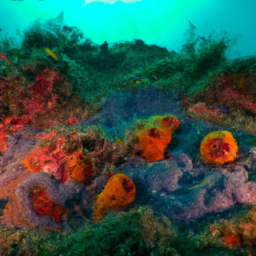The quest to understand the origins of life on Earth has long fascinated scientists and researchers alike. Recent studies suggest that sea sponges, simple yet resilient organisms, may hold the key to unraveling this mystery. According to emerging evidence, these prehistoric invertebrates likely emerged approximately 541 million years ago, potentially making them the first living creatures on our planet. In my experience as a science journalist, the significance of this discovery cannot be overstated. Sea sponges belong to a group of animals known as Porifera, which are characterized by their porous bodies and lack of complex tissues and organs. Their simplistic structure has led researchers to propose that they represent a crucial evolutionary step in the development of multicellular life. This perspective aligns with the prevailing scientific consensus that the origins of life are rooted in simpler forms before evolving into more complex organisms. Research indicates that the earliest sea sponges thrived in the oceans during the Cambrian period, a time marked by a rapid diversification of life forms. This period is often referred to as the Cambrian Explosion, during which many major groups of animals first appeared in the fossil record. Studies show that the fossilized remains of these ancient sponges provide critical insights into the evolutionary pathways that led to the emergence of more complex life. According to official reports from paleontologists, the morphology of early sponges suggests they played a pivotal role in shaping marine ecosystems. Their unique feeding mechanism, which involves filtering water to extract nutrients, likely contributed to the development of nutrient-rich environments conducive to the proliferation of other life forms. This filtering process not only supported the sponges themselves but also created habitats that benefited a wide array of marine organisms. Experts agree that understanding the biology of sea sponges can shed light on the evolutionary processes that shaped early life. For instance, specialized knowledge indicates that the genetic makeup of modern sponges shares similarities with those of other animal groups, suggesting a common ancestor. This genetic continuity provides a fascinating glimpse into the evolutionary history of life on Earth. Furthermore, the resilience of sea sponges in various environmental conditions speaks to their adaptability and evolutionary success. Research confirms that these organisms can thrive in diverse habitats, from shallow coastal waters to the deep sea. Their ability to withstand changes in temperature, salinity, and nutrient availability underscores their significance in marine ecosystems. In addition to their ecological importance, sea sponges have also garnered attention for their potential applications in medicine and biotechnology. Studies show that certain compounds derived from sponges exhibit antimicrobial and anti-inflammatory properties, making them valuable in the development of new pharmaceuticals. This aspect of sponge research highlights the interconnectedness of evolutionary biology and practical applications in human health. As observed, the implications of identifying sea sponges as potential first living creatures extend beyond the realm of biology. This discovery invites a reevaluation of our understanding of lifes origins and the evolutionary milestones that have shaped the diversity of life we see today. It raises questions about the conditions necessary for life to emerge and thrive, prompting researchers to explore the environmental factors that may have influenced early evolutionary processes. While the notion of sea sponges as the first living creatures is compelling, it is essential to acknowledge that this perspective is part of an ongoing scientific dialogue. Multiple sources confirm that the study of early life is complex and multifaceted, with various hypotheses and interpretations contributing to our understanding. The fossil record, while invaluable, is incomplete, and new discoveries continue to reshape our knowledge of lifes origins. In conclusion, the evidence suggesting that sea sponges may have been Earths first living creatures opens up exciting avenues for exploration in evolutionary biology. As researchers continue to investigate the genetic, ecological, and biochemical aspects of these ancient organisms, we can expect to gain deeper insights into the fundamental processes that have shaped life on our planet. The journey to uncover the mysteries of our origins is far from over, and the role of sea sponges in this narrative will undoubtedly remain a focal point of scientific inquiry for years to come.
TRENDING NOW
WORLD
Global Messaging Trends: Can Local Apps Like Arattai Overtake Giants?
44% 🔥
POLITICS
Accusations fly over whether Republicans or Democrats 'own' shutdown
35% 🔥
POLITICS
Rep. Mike Haridopolos, R-Fla., talks about the government shutdown
34% 🔥
POLITICS
What happens now that the government has shut down. And, a pricing deal with Pfi...
26% 🔥
POLITICS
Married, but no connection: Reality of silent divorces in Indian homes
31% 🔥
POLITICS
Netanyahu's apology to Qatar, phone on Trump's lap: A telling White House photo
38% 🔥
MOST READ
SPORTS
Week 5 NFL odds, lines, betting picks, spreads: 2025 predictions: Model backs Sa...
55% 🔥
SPORTS
Predicting every undefeated college football team's first loss: Will anyone beat...
36% 🔥
SPORTS
Tigers Lefty Tarik Skubal Deserves Second Straight AL Cy Young Award
54% 🔥
SPORTS
Jets Get Official Braelon Allen Injury Diagnosis
61% 🔥
SPORTS
Gill: India won't be 'looking for any easy options' against West Indies
49% 🔥
SPORTS
Phil Mickelson takes a jibe at golf during friendly banter with ex-LIV Golf CEO’...
39% 🔥

